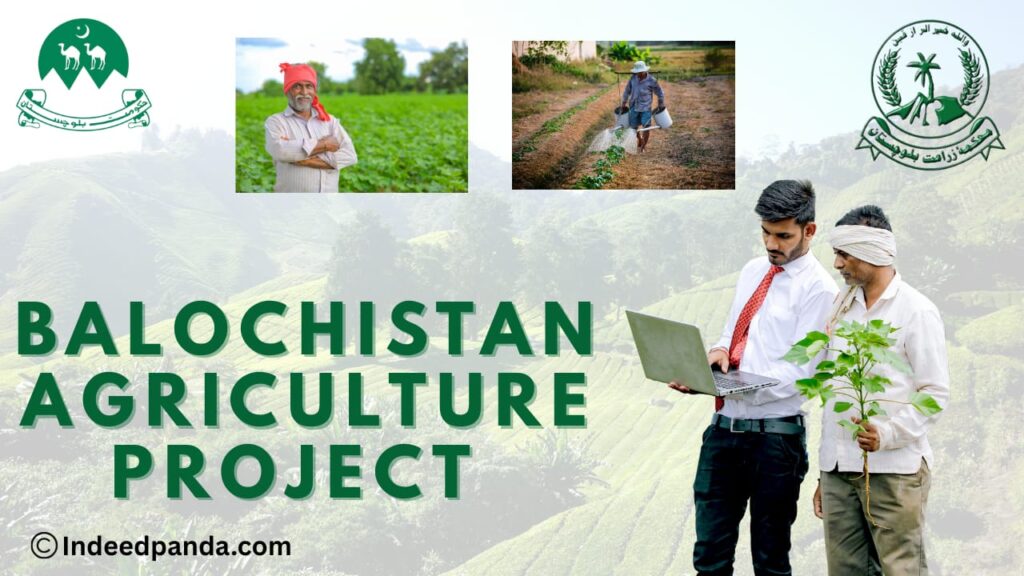Introduction
Balochistan, Pakistan’s largest province, holds immense Agricultural potential. However, its farming sector faces significant challenges, including water scarcity, outdated techniques, and limited access to modern technology. To address these issues, the Government of Balochistan, in collaboration with international partners such as the World Bank and FAO, launched the Balochistan Agriculture Project (BAP). This transformative initiative aims to modernize agriculture by promoting sustainable practices, enhancing water management, and connecting farmers with markets. The ultimate goals: improve food security, increase rural incomes, and reduce poverty across the province.

Core Objectives
- Efficient Water Management: Promote water-saving irrigation systems to mitigate drought impacts.
- Crop Diversification: Encourage a shift from traditional staples (e.g., wheat, maize) to high-value crops like fruits, vegetables, and pulses.
- Modern Technology Integration: Introduce advanced farming methods, climate-resilient seeds, and precision agriculture.
- Farmer Empowerment: Provide training, subsidies, and credit access to smallholder farmers.
- Market Connectivity: Strengthen value chains and build links with local and international buyers.
Key Features of the BAP
1. Improved Irrigation Infrastructure
- Drip & Sprinkler Systems: Subsidized water-efficient irrigation systems.
- Water Conservation Projects: Construction of small and check dams, plus rainwater harvesting.
- Canal System Upgrades: Rehabilitation of outdated canals in districts like Naseerabad and Jaffarabad.
2. Support for Farmers
- Input Subsidies: Discounted or free provision of certified seeds, fertilizers, and pesticides.
- Training Programs: Workshops on pest control, organic farming, and post-harvest techniques.
- Climate Adaptation: Distribution of drought-tolerant crops (e.g., heat-resistant wheat).
3. Technology Integration
- Digital Agriculture: Mobile applications offering weather updates, soil testing tools, and real-time market prices (e.g., Balochistan Agri-Advisory app).
- Renewable Energy Use: Solar-powered tubewells and pumps to reduce fuel dependency.
- Cold Chain Infrastructure: Installation of cold storage units to reduce spoilage of produce like tomatoes and grapes.
4. Value Chain Enhancement
- Agro-Processing Units: Facilities for grading, packaging, and processing of horticultural crops.
- Market Linkages: Partnerships with exporters and retail networks such as the Horticulture Export Development Company.
- Farmer Cooperatives: Empowerment of farmer groups to negotiate better pricing and collective marketing.
5. Women’s Empowerment
- Gender-Inclusive Training: Tailored programs in kitchen gardening, poultry, and dairy production.
- Microfinance Access: Interest-free loans for women-led agricultural businesses.
Eligibility Criteria for BAP
- Residence: Must be a Balochistan domicile holder, with priority for smallholder farmers.
- Land Ownership: 2–25 acres of agricultural land. Exceptions made for landless workers in cooperatives.
- Sector Focus: Applicants involved in horticulture, cereal crops, or livestock.
- Gender Inclusion: Strong encouragement for women and women-led cooperatives.
Application Process for BAP
- Registration: Apply via the Baluchistan Agriculture Department website or local office.
- Documentation: Submit land proof, CNIC, and bank details.
- Field Verification: Site visits conducted to confirm eligibility.
- Mandatory Training: Participation in orientation and training sessions.
- Approval: Receive subsidies, tools, or irrigation equipment upon final approval.
Ongoing Challenges
- Water Scarcity: Depleting groundwater and inconsistent rainfall.
- Technology Resistance: Traditional mindsets hindering adoption of modern practices.
- Funding Delays: Lag in the distribution of subsidies and infrastructure development.
- Market Access Issues: Poor logistics and storage in remote areas.
- Climate Risks: Frequent droughts and floods damaging crops and infrastructure.
Project Impact
- Higher Yields: 30–50% increase in productivity in targeted districts (e.g., apple farms in Pishin).
- Water Efficiency: Drip irrigation cut water use by 40% on date farms.
- Farmer Prosperity: Over 20,000 farmers trained; average incomes rose by 25%.
- Export Expansion: 15% growth in fruit exports (e.g., apricots and dates) to Gulf countries.
- Inspiring Success Stories:
- Abdul Rahim (Kech): Doubled date yields using solar irrigation.
- Sakina (Pishin): Expanded her apple orchard and now supplies major cities.
- Naseerabad Cooperative: Increased collective profits by 35%.
Note:
Please visit official website for more information regarding this https://agriculture.balochistan.gov.pk/





